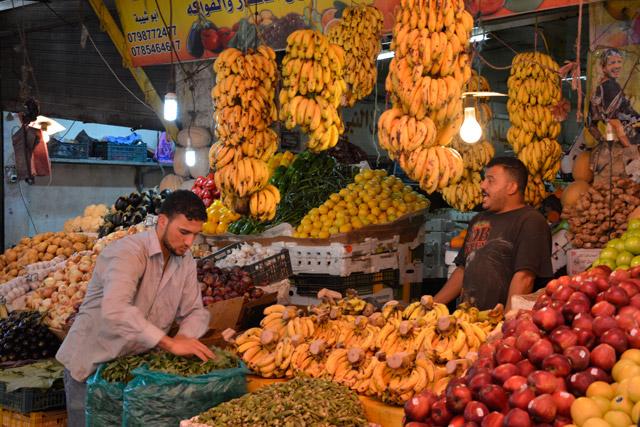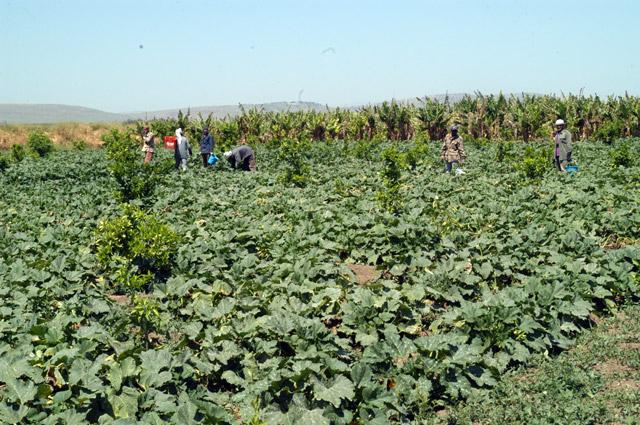You are here
UAE says vegetable ban 'precautionary' as Jordan reaffirms commitment to international standards
By Hana Namrouqa - Apr 25,2017 - Last updated at Apr 25,2017

All countries importing Jordanian fruits and vegetables testify to the high quality of the Kingdom’s produce, according to the Agriculture Ministry (Photo by Amjad Ghsoun)
AMMAN — The United Arab Emirates’ ban on imports of some Jordanian vegetables is precautionary and will be implemented if exporters sent produce that does not meet mutual agreements, the UAE Ambassador to Jordan Bilal Al Budoor said on Tuesday.
“The UAE is taking precautionary measures in the import of vegetables. It demands commitment to the standards and the signed agreements governing the matter to elevate the quality of imports and eliminate pathogens such as bacteria and pesticides residues,” Budoor said in a statement to The Jordan Times.
The ministry of climate change and environment in the UAE had announced a decision to ban the import of seven of Jordan’s main vegetable exports as of mid-May.
The ban was put in place due to increasing levels of chemical pesticide residues in Jordan’s agricultural products. The vegetables reportedly banned include all types of zucchini, sweet pepper, eggplant, cabbage, green beans, cauliflower and lettuce.
The UAE’s decision also stipulated that imports of any fruit and vegetables, besides the aforementioned, be coupled with certificates from the Jordanian Ministry of Agriculture indicating that the produce was free from pesticide remnants.
“The decision will go into force mid-May if exporters failed to heed to the agreements,” Budoor noted.
He underscored that Minister of Agriculture Khaled Hneifat and UAE Minister of Climate Change and Environment Thani Al Zyoudi discussed the decision and ways to address the matter in a phone call.
Hneifat and Budoor met at the Ministry of Agriculture on Tuesday morning to discuss the recent ban on some of the vegetables.
The ministry released a statement indicating that Hneifat briefed the the UAE’s ambassador on Jordan’s strict testing process and commitment to international standards and mutual agreements.
“There are no health concerns regarding Jordan’s agricultural produce, whether sold in the local market or exported. The volume of Jordanian agricultural produce to the Arab Gulf countries and Europe is a proof to that…,” Hneifat told the ambassador, according to the statement.
During Tuesday’s meeting, Hneifat said that all countries importing Jordanian fruits and vegetables testify to the high quality of the Kingdom’s produce, the statement said.
“Just recently, the ministry collected and tested 15,000 samples of fruits and vegetables for residues of pesticides, the tests indicated that there are barely any traces with a percentage of 3 per cent,” the statement quoted Hneifat as saying to the ambassador.
Ministry’s spokesperson Nimer Haddadin said that the ministry invited technical delegations from the UAE to visit the country and check its laboratories, farms and testing measures of exported fruits and vegetables.
Jordan Exporters and Producers Society for Fruits and Vegetables said that the UAE is one of Jordan’s biggest importers of fruits and vegetables, with over 150,000 tonnes of produce exported annually.
The UAE’s ministry of climate change and Environment said countries affected by the ban must submit certificates to indicate that all other vegetables and fruits are free of pesticide residues before imports can resume and they have been asked to comply with the food safety standards, according to the National newspaper in the UAE.
The Gulf News reported that the climate change and environment ministry issued an advisory noting that it has “banned imports of certain vegetables and fruits from select countries with effect from May 15, 2017 as those products have been found to contain pesticide residues in excess of permissible limits".
"The countries that will be impacted by the ban include Egypt, Oman, Jordan, Lebanon and Yemen,” the ministry announced on Monday, according to the paper.
Related Articles
AMMAN — Minister of Agriculture Khaled Hneifat and United Arab Emirates Ambassador to Amman Bilal Al Budoor are scheduled to meet on Tuesday
AMMAN — Jordanian exporters of agricultural produce have stopped exporting several types of vegetables to the United Arab Emirates and other
AMMAN — Private sector laboratories will soon begin assisting authorities in the testing of fruits and vegetables for pesticide residues, a


















